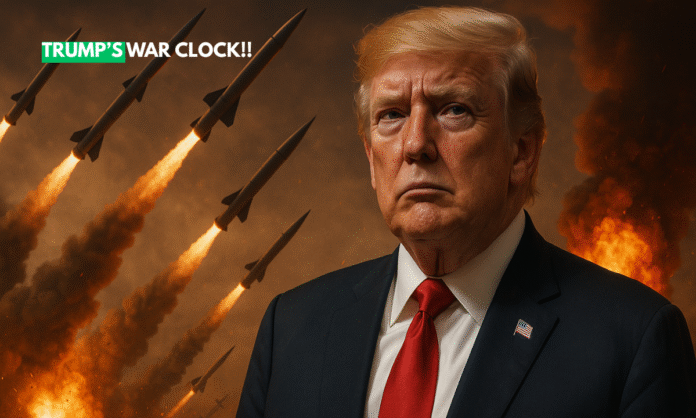Summary
- US President Donald Trump has set a 14-day window to decide on American military involvement in Israel’s war against Iran, citing potential diplomatic negotiations.
- Critics argue the “two-week” timeline may be a strategic delay tactic — either to facilitate diplomacy or secretly prepare for a more forceful strike.
- Israel continues its offensive independently, with PM Netanyahu declaring readiness to hit all nuclear sites, regardless of US participation.
The 336-Hour Gamble: Trump’s Cryptic Countdown to War or Peace
Eight days into a relentless exchange of missiles between Israel and Iran, the world is now watching a new timer tick down — a 14-day deadline set by US President Donald Trump, during which he says he will decide whether America will directly join the conflict.
Announced by White House Press Secretary Karoline Leavitt on Thursday, the deadline came with ambiguity wrapped in intention. “Based on the fact that there’s a substantial chance of negotiations… I will make my decision whether or not to go within the next two weeks,” Trump said.
But observers and diplomats alike are split: Is this a final chance for peace — or a cleverly disguised prelude to war?
🇮🇷🇺🇸🇮🇱| On the interpretation of Trump's 2-week deadline:
— EAST AFRICAN TIMES (@EACTIMES) June 21, 2025
CNN: This is part of a game of deception to keep Tehran confused, while Trump has actually decided to intervene. pic.twitter.com/gV4i6ncbbk
Between Delay and Decision: The Many Faces of Trump’s Two Weeks
- Trump has a history of using the “two-week” deadline in political rhetoric — from healthcare to foreign policy — with decisions often delayed or abandoned.
- Analysts question the credibility of this new timeline, especially after similar warnings regarding Russia and Ukraine went unfulfilled.
- Some believe it’s simply a stalling tactic, offering room for diplomatic optics without firm commitment.
This isn’t the first time Trump has used a “wait two weeks” approach. From promising sanctions against Russia to unveiling a long-promised healthcare plan, these deadlines often act as rhetorical tools rather than policy triggers.
Former admiral James G. Stavridis called it out as possibly “a very clever ruse”, suggesting the US might be preparing for military action while coaxing Iran into complacency.
A reporter in Thursday’s briefing even highlighted this recurring pattern, but Press Secretary Leavitt dismissed the concern, insisting that Iran and Russia were separate issues and that the president’s intent was genuine.
The Diplomatic Opening: Is There Still Room to Talk?
- European foreign ministers from Germany, France, and Britain are flying to Geneva to initiate talks with Iran’s representatives.
- Britain’s Foreign Secretary David Lammy emphasized a “narrow but real window” for diplomacy.
- The US may be leveraging this two-week gap to let its allies pursue backchannel talks before committing to war.
Some believe Trump is offering diplomacy one last chance. European diplomats are scrambling to revive a dialogue, even as missiles continue to rain down.
“The president is giving everyone — including Iran — just enough time to come to the table and make a deal,” said Shira Efron, senior fellow at the Israel Policy Forum.
Al Jazeera’s Doha Jabbari argued that the pressure on Iran is real: “If they don’t show up, it’ll be used as proof that they don’t want peace.”
Or Is It Strategic Deception?
- Military analysts argue the 14-day window could be used to reposition US forces, including a second aircraft carrier group.
- It allows Israel more time to degrade Iranian defences, especially around Fordow and other nuclear facilities.
- The delay may also be a psychological maneuver to make Iran lower its defences or hold back retaliatory fire.
Even if it’s not a bluff, the delay has practical military utility. Reinforcements, carrier deployment, and coordination with allies all benefit from time. The New York Times reports that Israel is already using this period to further dismantle Iran’s air defences around key nuclear sites, preparing the ground should the US eventually step in.
This theory suggests that Trump’s “wait and watch” approach is less about peace, and more about timing an optimized first strike.
ties, and a growing strategic divergence with Washington on timelines and thresholds.
Final Countdown: What Happens If the Deadline Passes?
Trump’s 14-day window may offer a pause — but it’s one loaded with possibilities:
- If diplomacy succeeds, it may lead to an eleventh-hour de-escalation, potentially mediated through European channels.
- If diplomacy fails, Trump will face pressure to act, especially as Iran inches closer to nuclear breakout capability.
- If Israel escalates, it could force Trump’s hand regardless of diplomatic status.
As the hours tick down, 336 to be precise, the question isn’t just whether Trump will act—but whether he can afford not to.


